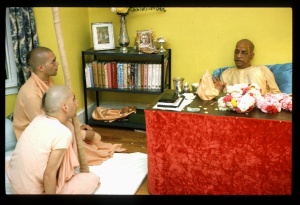SB 8.4.15

A.C. Bhaktivedanta Swami Prabhupada
TEXT 15
- yathānukīrtayanty etac
- chreyas-kāmā dvijātayaḥ
- śucayaḥ prātar utthāya
- duḥsvapnādy-upaśāntaye
SYNONYMS
yathā — without deviation; anukīrtayanti — they chant; etat — this narration of the deliverance of Gajendra; śreyaḥ-kāmāḥ — persons who desire their own auspiciousness; dvi-jātayaḥ — the twice-born (brāhmaṇas, kṣatriyas and vaiśyas); śucayaḥ — especially the brāhmaṇas, who are always clean; prātaḥ — in the morning; utthāya — after getting up from sleep; duḥsvapna-ādi — beginning with sleeping badly at night; upaśāntaye — to counteract all troublesome positions.
TRANSLATION
Therefore, after getting up from bed in the morning, those who desire their own welfare—especially the brāhmaṇas, kṣatriyas, vaiśyas and in particular the brāhmaṇa Vaiṣṇavas—should chant this narration as it is, without deviation, to counteract the troubles of bad dreams.
PURPORT
Every verse in the Vedic literature, especially in the Śrīmad-Bhāgavatam and Bhagavad-gītā, is a Vedic mantra. Here the words yathānukīrtayanti are used to recommend that this literature be presented as it is. Unscrupulous persons, however, deviate from the actual narration and interpret the text in their own way with grammatical jugglery. Such deviations are to be avoided. This is a Vedic injunction supported by Śukadeva Gosvāmī, one of the mahājanas, or authorities. He says, yathānukīrtayanti: one should recite the mantra as it is, without deviation, for then one will be eligible to rise to the platform of all good fortune. Śukadeva Gosvāmī especially recommends that those who are brāhmaṇas (śucayaḥ) recite all these mantras after rising from bed in the morning.
Because of sinful activities, at night we have bad dreams, which are very troublesome. Indeed, Mahārāja Yudhiṣṭhira was obliged to see hell because of a slight deviation from devotional service to the Lord. Therefore, duḥsvapna—bad dreams—occur because of sinful activities. A devotee sometimes accepts a sinful person as his disciple, and to counteract the sinful reactions he accepts from the disciple, he has to see a bad dream. Nonetheless, the spiritual master is so kind that in spite of having bad dreams due to the sinful disciple, he accepts this troublesome business for the deliverance of the victims of Kali-yuga. After initiation, therefore, a disciple should be extremely careful not to commit again any sinful act that might cause difficulties for himself and the spiritual master. Before the Deity, before the fire, before the spiritual master and before the Vaiṣṇavas, the honest disciple promises to refrain from all sinful activity. Therefore he must not again commit sinful acts and thus create a troublesome situation.